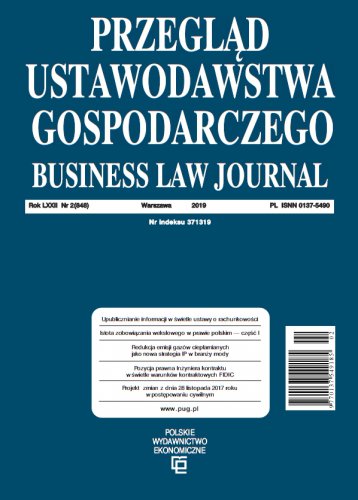International tax competition versus optimisation strategies adopted by holding companies in tax havens
Międzynarodowa konkurencja podatkowa a strategie optymalizacyjne holdingów wykorzystywane w rajach podatkowych
The subject-matter of the article is presentation of the phenomenon of international tax competition which is related to the developing tax policies of countries. It is particularly important to distinguish the phenomenon under discussion from harmful tax competition. In the course of elaboration, it is necessary to mention tax havens that exert a substantial influence both on international and harmful tax competition. Holding companies also influence international tax competition as they adopt numerous tax engineering instruments within the framework of their tax strategies. The present article indicates the most important as well as the most up-to-date ones. The elaboration also presents how the relations and links that are being shaped between countries that are tax havens (though not only) and international holding companies impact international tax competition.
Przedmiotem artykułu jest przedstawienie zjawiska międzynarodowej konkurencji podatkowej, które wiąże się z kształtującymi się politykami podatkowymi państw. Szczególnie istotne jest odróżnienie omawianego zjawiska od szkodliwej konkurencji podatkowej. W ramach opracowania odniesiono się do rajów podatkowych, które mają istotny wpływ zarówno na międzynarodową, jak i na szkodliwą konkurencję podatkową. Na międzynarodową konkurencję podatkową wpływają również holdingi międzynarodowe, które w ramach swoich strategii podatkowych wykorzystują liczne instrumenty z zakresu inżynierii podatkowej. Niniejszy artykuł wskazuje najistotniejsze, ale i najbardziej aktualne z nich. Opracowanie przedstawia również, jak na międzynarodową konkurencję podatkową oddziałują kształtujące się relacje i powiązania zachodzące pomiędzy państwami będącymi rajami podatkowymi (ale nie tylko) a holdingami międzynarodowymi.
Bibliografia
Bibliografia/References
Baumgartner, J. (2017). Treaty shopping in international investment law. Oxford University Press.
Devereux, M. P., Lockwood, B., Redoano, M. (2008). Do countries compete over corporate tax rates? Journal of Public Economics, 92(5/6). https://doi.org/10.1016/j.jpubeco.2007.09.005
Endres, D., Schreiber, C., Dofmuller, A. (2006). Holding companies are key international tax planning. International Tax Review, (1).
Gajewski, D. J. (2017). Holding. International taxation in the European Union. Warszawa: Oficyna Wydawnicza SGH.
Gajewski, D. J. (2021). Selected methods of countering treaty shopping in the context of cross-border activity of groups of companies. Przegląd Ustawodawstwa Gospodarczego, (4). https://doi.org/10.33226/0137-5490.2021.4.2
Głuchowski, J. (1996). Oazy podatkowe. Warszawa: Wydawnictwo ABC.
Ihori, T., Yang, C. C. (2009). Interregional tax competition and intraregional political competition: the optimal provision of public goods under representative democracy. Journal of Urban Economics, 66(3). https://doi.org/10.1016/j.jue.2009.08.001
Jacobs, J. P. A. M., Ligthart, J. E., Vrijburg, H. (2010). Consumption tax competition among governments: evidence from the United States. International Tax and Public Finance, 17(3). https://doi.org/10.1007/s10797-009-9118-z
Keen, M., Konrad, K. A. (2012). The theory of international tax competition and coordination, Working Paper of the Max Planck Institute for Tax Law and Public Finance, No. 6.
Kempf, H., Rota, G. G. (2010). Endogenizing leadership in tax competition: a timing game perspective, Working Papers 299, Banque de France.
Kotsogiannis, Ch. (2010). Federal tax competition and the efficiency consequences for local taxation of revenue equalization. International Tax and Public Finance, 17(1). https://doi.org/10.1007/s10797-008-9094-8
Orlov, M. (2005). The concept of tax haven: A legal analysis. London: Kluwer Law International.
Pankiv, M. (2016). Post-BEPS application of the arm's length principle to intangibles structures. International Transfer Pricing Journal, (11/12).
Peralta, S., van Ypersele, T. (2006). Coordination of capital taxation among asymmetric countries. Regional Science and Urban Economics, 36(6). https://doi.org/10.1016/j.regsciurbeco.2006.03.002
Peters, C., Snellaars, M. (2001). Non-discrimination and tax law: Structure and comparison of the various non-discrimination clauses. EC Tax Review, (1).
Sørensen, P. B. (2004). International tax coordination: regionalism versus globalism. Journal of Public Economics, 88(6).
Sørensen, P. B. (2007). Can capital income taxes survive? And should they? CESifo Economic Studies, 53(2).
Tell, M. (2017). Interest limitation rules in the post-BEPS era. Intertax, 45(11).
Zodrow, G. R. (2010). Capital mobility and tax competition. National Tax Journal, 63(4).

